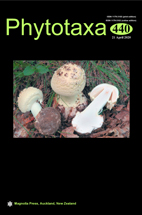Abstract
Although described as a distinct species, Paepalanthus elatus is currently considered as a variety of P. argenteus and known only from the type collection. Here, we perform the most comprehensive morphological analysis of P. elatus to date, derived from field and herbaria observations, including morphometry of vegetative and reproductive characters. The results support reestablishment of the taxon at species level. A recircumscription of the taxon is provided based on a complete description. The pistillate flowers are described in detail for the first time. We present notes on phenology, conservation status, and taxonomy, including a second-step lectotypification of the name Paepalanthus elatus, together with detailed photographs of living plants and a distribution map. Paepalanthus elatus is micro-endemic to a district called Fechados, Santana do Pirapama municipality, northern Serra do Cipó, in the Campo Rupestre vegetation of the Espinhaço Range, and should be considered critically endangered according to IUCN criteria. Our recognition of P. elatus as an accepted species raises the number of species of P. subg. Xeractis to 29.

